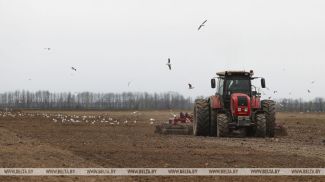MINSK, 27 January (BelTA) - Belarus applies international standards in the development of its nuclear safety infrastructure, Olga Lugovskaya, Head of the Nuclear and Radiation Safety Department of the Belarusian Emergencies Ministry (Gosatomnadzor) told a briefing in BelTA's press center on 27 January.
“The development of regulatory infrastructure is based on international approaches. There are a number of the IAEA regulatory technical and guidance documents that tell what documents and infrastructure elements should be prepared in the country,” Olga Lugovskaya said.
One of the IAEA key documents is a special safety guide entitled Establishing the Safety Infrastructure for a Nuclear Power Program (SSG-16). It explains what stages a country must go through as it develops nuclear and radiation safety infrastructure.
As soon as Belarus joined the club of nuclear countries the state has become part of the global nuclear safety regime. According to Olga Lugovskaya, this means that the country accedes to international legal instruments, such as conventions and codes of conduct. Belarus is a contracting party to a number of conventions and agreements, including the Nuclear Non-Proliferation Treaty, the Convention on Nuclear Safety, the Joint Convention on the Safety of Spent Fuel Management and on the Safety of Radioactive Waste Management, the Code of Conduct on the Safety and Security of Radioactive Sources, and others.
fff1
In addition, a country must adopt a comprehensive set of nuclear safety standards and develop national safety infrastructure.
Gosatomnadzor advisor Oleg Sobolev pointed out that in 2008, when it was decided to build a nuclear power plant, Belarus was already a contracting party to a number of international conventions and agreements on nuclear safety. Gosatomnadzor is directly responsible for enforcing the Convention on Nuclear Safety, the Joint Convention on the Safety of Spent Fuel and Radioactive Waste Management and the agreement between Belarus and the IAEA on the Treaty on the Non-Proliferation of Nuclear Weapons. Oleg Sobolev explained that the accession to these conventions is associated with a number of internal obligations, such as establishment of an independent regulatory body.
In view of Belarus' obligations under the Convention on Nuclear Safety, the country prepared its last report on the implementation of that convention in 2019 and the report on the Joint Convention on the Safety of Spent Fuel and Radioactive Waste Management in 2020. In accordance with established procedure, countries that have ratified conventions examine the national reports of other contracting parties, formulate questions to them, and provide answers to questions to their own report. The reports are prepared on the basis of a three-year cycle.
Belarus' latest report on the implementation of the Convention on Nuclear Safety received 239 questions (only Finland, Russia and China had more). “This demonstrates the very great interest of the professional international community in the current stage of the Belarusian nuclear power program,” Oleg Sobolev said and added that the Belarusian side had answered all the questions.
As for the Joint Convention, Belarus is now studying the reports of other countries to ask questions.
The review of national reports on the conventions identifies challenges that countries need to address in the next three-year period, and also success stories that other countries can learn from.
Olga Lugovskaya added that Gosatomnadzor is getting ready to issue a license to operate the BelNPP. Public hearings will precede the move.











